1. God is good and He created everything in the beginning as GOOD and VERY GOOD. There was not evil in God's creation, nor is God the creator or author of evil. Read through Genesis 1 and 2 and you'll find that recurring pronouncement of God that everything was GOOD.
I find helpful here the story I've heard of the man who created dynamite. It's said he invented the explosive stuff to help build roads and railroads - to be a help to mankind. And it was even used in mountain art carvings to create beauty and culture and all things good. That's what he thought he was making and the GOOD he intended it for. But then someone thought, what if I lit the fuse and threw it at another human being? And thus what was created good for the help and benefit and beautification of the life of man was corrupted into a weapon to take life; to bring death.
2. Evil is not God's doing, but a corruption of God's good because of the lies and murdering of the Devil. Prior to the Fall into sin of Genesis 3, Adam and Eve were good. They were free - they had the will to be free - to do good. It'd be like a man who had the choice to either gift his wife flowers or chocolates; both equally good, both equally a choice, but a good choice made out of love with no thought toward evil. That's the kind of freedom of will Adam and Eve had. So, if they're good already, what is gained by eating from the Tree of the Knowledge of Good and Evil? If you're already good, the only outcome is the ADDITION of EVIL. And that's exactly what happened in the Fall. The Devil and Mankind introduced Evil into God's good creation. So that now
- Both our spiritual life and our physical life are corrupted by evil that leads people to do unspeakable things to each other.
- The relationship of harmony and care between men and women and the creation has been filled with enmity, thorns, hard labor, and death, that leads to the burdensome evils of vain toil and greed and feelings of inadequacy/worthlessness.
- The complementary relationship of equality between man and woman has been filled with the desire for dominance and malcontment, that leads to broken homes and families, abuse, neglect, and all manner of shameful treatment of others.
- The whole creation, itself, has been subjected to futility in the corruption that leads to cataclysmic events such as hurricanes, fires, earthquakes, tornadoes, famines and all manner of natural disasters that bring suffering and death that God never intended.
- Man and woman are corrupted in themselves by the evil and pass that addition of corruption down through their generations that led the Apostle Paul to collect all of those Old Testament references together in one place, in Romans 3, that rightly summarizes our sinful condition as "There is none who is righteous; no, not even one."
The early Church and the Reformers found the illustration helpful, here, of a glass of wine. In and of itself, wine is good. But add a drop of toxic poison into the wine - on the top, at the bottom, along the side, it doesn't matter where you add it - and suddenly the whole cup of wine has been corrupted and is poison. The wine is still wine, but because of the corruption, you can't separate the wine from the poison. In the same way, our human nature is good (that's why Jesus can have a human nature and still be perfect). But because of the corruption of sin in our nature, we are not good but wholly evil in God's sight, according to God's holy standard.
3. But God, in his goodness and love cannot leave His creation in evil and death and misery. So He, himself, provides the remedy. He makes the promise in Genesis 3 of the seed of the woman to crush the serpent's head and then works all of time and history together to bring about the perfect timing and outcome of His redemption, until, "In the fullness of time, God sent forth his Son, born of a woman, born under the Law, to redeem those under the Law." Jesus accomplishes God's reversal of every evil our own sin introduced into the world.
- By coming in the flesh, he redeems not only our spirits but also our bodies.
- By casting Satan out from the cross and overcoming him and his minions by the blood of the Lamb and the word of their testimony, he defeats Satan and puts a stop to his lies and murderous power forever. In the absence of Satan's lies, there is only God's Word of life and mercy.
- By dying on the cross he overcame the curse of death by his death and paid the full ransom price of our sins (just as was first foreshadowed by the clothing of Adam and Eve with animal skins after the first sin). In the absence of the fear of death and condemnation, life can be experienced and lived to its fullest ("I have come that they may have life and have it abundantly").
- By dying on the cross to forgive those who sinned against him, and by breathing His Spirit into those who believe in Him, Jesus gives us the power, the motivation, the example, and the essence of the forgiveness that we can and should give to others. This is especially true of those who are united Man and Woman, husband and wife. In this forgiveness in the blood of Jesus, reconciliation and unity is possible, and so peace.
- By rising again on the third day he promised our resurrection in the fullness of God's time, which collects together all of God's promises of a new creation, a resurrection - if you will - of the creation, itself that Paul says in Romans 8 waits with eager expectation for it's renewal in the revealing of the sons of God. In this new creation there will be no more natural disasters of death and suffering.
- By dying on the cross, washing us in Holy Baptism, and feeding us with his body and blood in the Holy Supper, Christ is cleansing our souls even as we await for the renewal of our bodies in the resurrection; of which we've seen Christ's resurrection as the firstfruits of the Lord's harvest and full redemption.
That is how God handles the issue of the Evil that our own sin has brought into His Good world. Put simply:
1. God made us and all Creation Good.
2. The Devil and our first-parents introduced Evil into the creation by rejecting God and His Word.
3. God gave His eternally-begotten Son to be incarnate in the fullness of time in order to redeem and restore and reconcile His fallen creation. As we have seen the firstfruits of that redemption, we await the next day of the fullness of time when Christ returns to raise the dead, renew the creation, and dwell with His people forever.
Now, if you can see that, then you're on the right track. However, that's not the end of what we need to say regarding evil in this world. We still have to give an account of why there is still suffering in this life that Christ has redeemed. When your loved one dies, when you contract a life-altering disease or disability, when God allows natural disasters to occur, how can that be explained in the way God intended to bring comfort and peace and faith? This is where the rubber really hits the road. We've explained why there's Evil and what God has done and is doing about it. But what about suffering?
4. The Bible teaches that God has a purpose for allowing suffering; and, what's more, that NOT ALL SUFFERING IS EVIL. This is probably the hardest truth for the world to understand: that not all suffering is evil. We run away from suffering, do everything we can to prevent suffering, in our age. And so suffering has come to be seen as objectively, absolutely evil. That kind of absolute statement must be denied and decried by the Christian - if for no other reason than the simple truth that it was for the greatest good that Christ suffered on the cross. That's why we call it GOOD FRIDAY. God has done everything to save us from the evil we've brought into the world. Which means, if we suffer, we can know that it is either because of our own evil or because God has a purpose for that suffering. So we look to the Scriptures, especially in the New Testament's reflections on the suffering of Christ and His Church, and we find God's purpose for suffering. Read Romans 5, James 1, and 1 Peter 4 and you'll find almost verbatim a consistent message that "We rejoice in our sufferings" as Christians because God is using that suffering to prove/test/refine our faith, hope, and love in this life.
Consider the weightlifter or the cardio-trainer. It's only by causing our muscles, including our heart, to suffer a measure that we grow stronger. The very muscles in our body react to suffering by growing bigger, stronger, more capable. As Paul says it, that suffering in the muscles produces endurance, the body's response to create endurance is a new character of bigger and stronger muscles, and that new character produces the hope and the confidence that we are now newly able to handle even more weight and strain than we once were - all because our muscles suffered. If there is no suffering, no use of the muscles, they atrophy. And, in the same way, if our faith is not tested, if we don't exercise our faith in the world of trials, tests, and refinements, our faith will atrophy.
With that perspective, we come to understand that much of the suffering we undergo in this life is for the sake of strengthening our faith - not as if God is testing to try to catch us and make us fail, but as a good and loving God who puts us through these trials because he already knows that we can endure and he wants us to be able to see that truth for ourselves.
It's the same thing as the parent who gets to teach their kid to ride the bike without training wheels. How many stories are there of the good and loving father who was holding on, congratulating the kid on doing so great, and then - BETRAYAL! - the dad lets go. The kid does great so long as they don't realize the fact, but upon discovery there's no more parent holding the bike, crash and cry ensue. The parent knows the kid can ride the bike. But you need to let the kid prove it to themselves, first - even when doing that usually involves that crash and frustration - that suffering.
That's how the Apostles viewed God's use of suffering in their lives. And whatever suffering God allowed, they trusted that God had a reason and a purpose of love and the desire for them to grow in character and hope. And we see throughout the New Testament that this character we're supposed to grow into is the image of Jesus: the Jesus who helped, the Jesus who taught, the Jesus who suffered, bled, and died. So, if we're called to be "little-Christs," Christians, we should expect God to use us to show the world suffering for the sake of the name of Jesus. That's why the Apostles can rejoice in their sufferings, because it can only serve to draw them closer to the one who loved and died and lived for them.
And to that must be added Hebrews 12 reminder that suffering is also used by God for the sake of discipline. Now, let's remember that discipline is simply the actions required to make a disciple. Discipline is directly related to the world Discovery. True discipline is about leading someone down the path of the disciple; providing correction and encouragement; punishment of the bad as well as encouragement of the good. Either way, the point of discipline, in light of the redemption of God in Christ, is to keep us in the faith in Jesus. And the Father will discipline his sons and daughters. And if you won't be budged from straying with simple words, suffering will be added to keep you disciplined.
It's like my 3 year old who's usually awesome at staying next to mom and dad and holding hands as we walk through the parking lot. But, sometimes some wild hair strikes and she tries to bolt. If we let her do that, she could easily get hit by a car. So, what do you do? When you feel that resistance or her start to pull away, you take a firm hold of her hand. Light, not unpleasant, but still, could call it suffering. She's three - so what about the times she then throws the fit, really resists, balls and screams, and tries with all her strength to get away? You hold tighter. You pick her up. You speak sternly. Depending on the kid's personality, maybe you give a swat. What is all of that but suffering? What is that but discipline? And all because we love our daughter and won't let her do something we know better than she does will get her hurt. Discipline.
This is how God uses suffering in the world. Certainly, then, not all suffering is bad. And more, ALL suffering for the Christian must have a purpose from God and must therefore be allowed for the sake of His good and our good - whether to refine our faith, give us a reason to rejoice in Jesus' suffering, or for the sake of discipline.
So, if you can hold these 4 points together, you can give a godly and comfort-filled explanation to those who struggle with the problem of evil in the world.
1. God made us and all Creation Good.
2. The Devil and our first-parents introduced Evil into the creation by rejecting God and His Word.
3. God gave His eternally-begotten Son to be incarnate in the fullness of time in order to redeem and restore and reconcile His fallen creation. As we have seen the firstfruits of that redemption, we await the next day of the fullness of time when Christ returns to raise the dead, renew the creation, and dwell with His people forever.
4. Suffering is not always Evil. It can either be the result of our own evil actions, or it can be allowed by God for our strengthening, encouragement, or discipline.

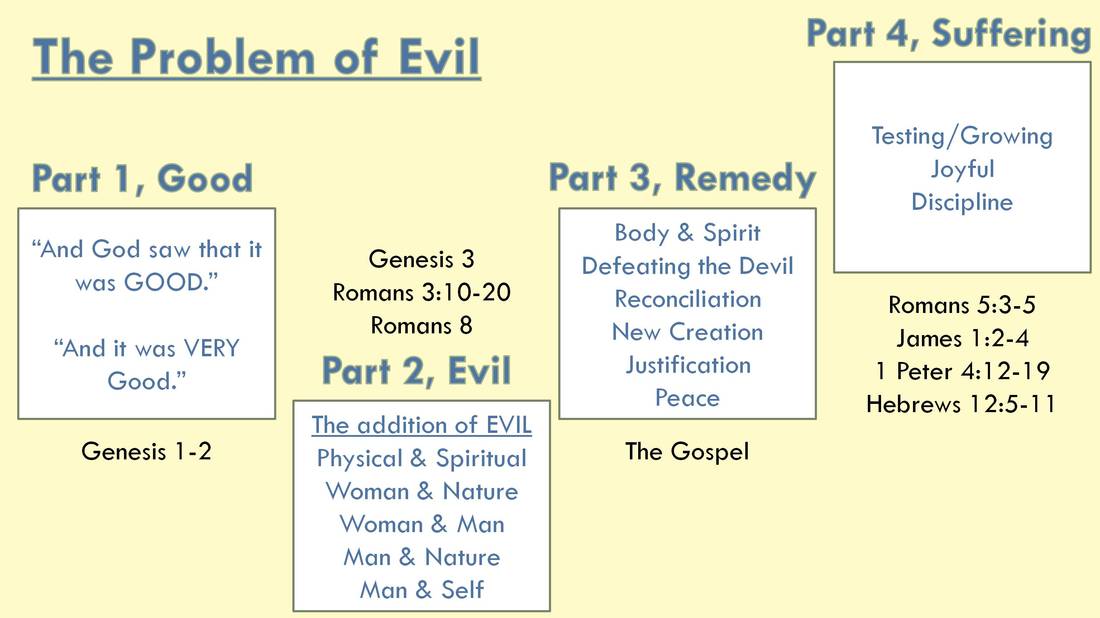
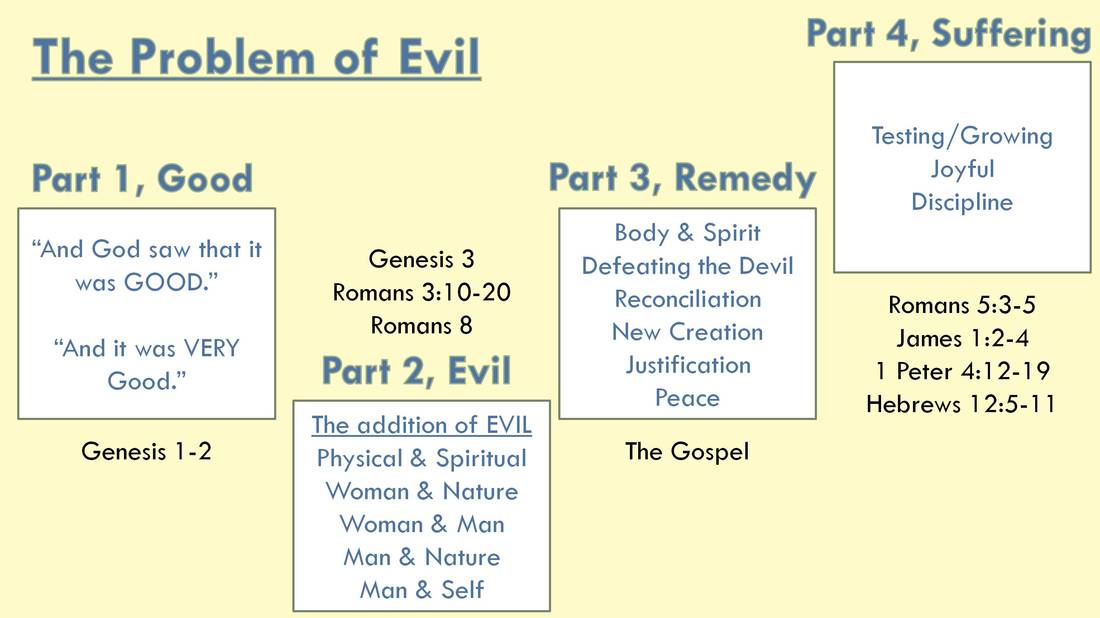

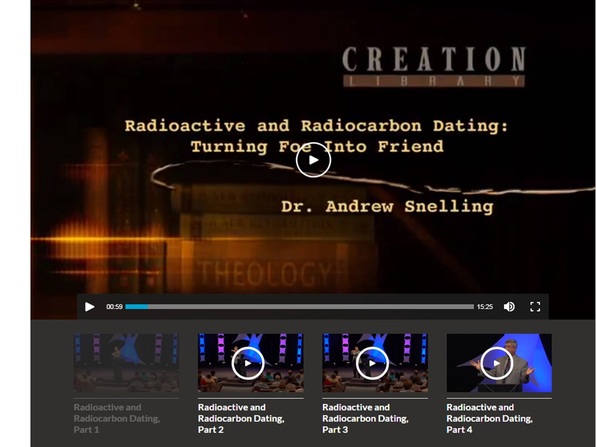
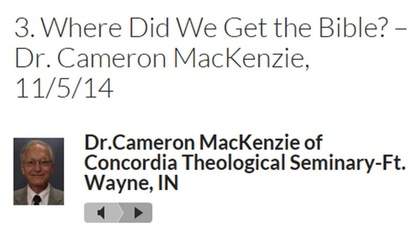

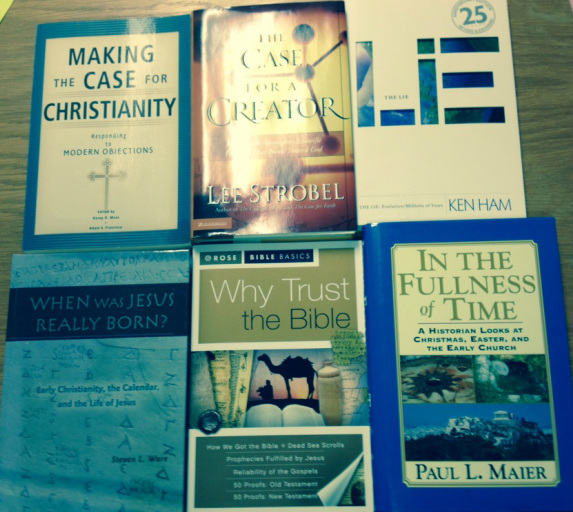
 RSS Feed
RSS Feed